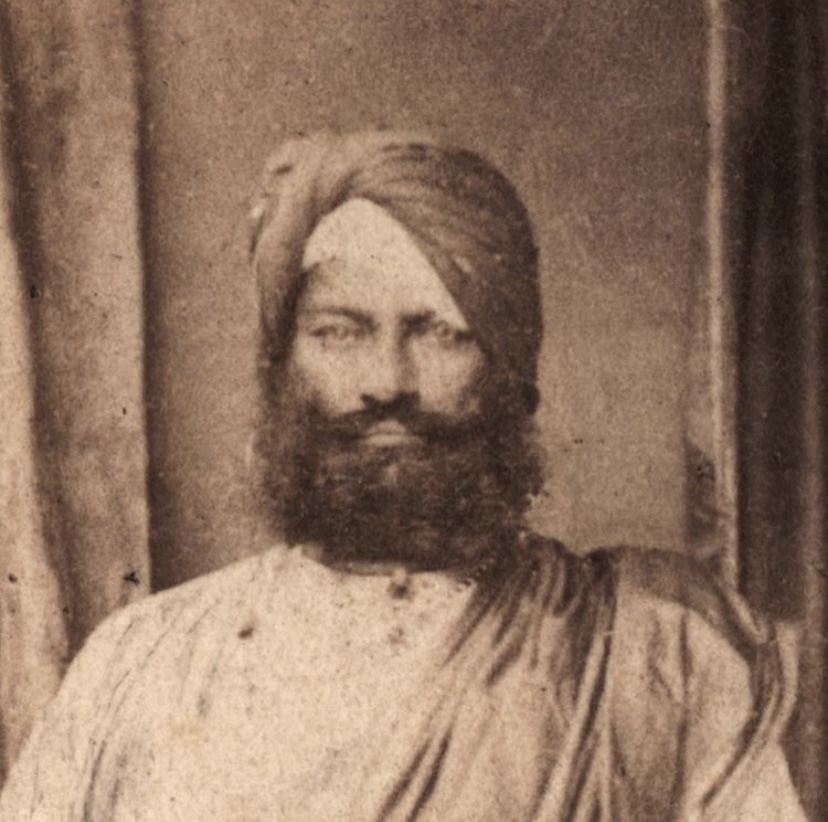CHALITARJOTlJOTI SAMAVANE KE, one of a collection of seven unpublished Punjabi manuscripts held in the Khalsa College at Amritsar under catalogue No. 1579E. Comprising a bare three folios (3063-08), it is divided into two sections. The first part (ft. 3063-07) entitled "Verva Guriai ka Likhia," lit. details recorded of the guruship, gives the duration for which each of the ten Gurus occupied the holy seat, followed by a vague remark that 24 years and 3 months have elapsed since he passed away, implying thereby that the writing took place 24 years and 3 months after the death (in 1708) of the tenth and last of the Gurus, Guru Gobind Singh, which takes the date of the compilation of the manuscript to 1732.
Explore the life of Kesari Chand, ally of Raja Bhim Chand, as he faces Guru Gobind Singh and joins historic battles in the Sivalik foothills.
CHATURBHUJ POTHI, which forms the third part of what is known as the Miharban Janam Sakhi, is the work of Sodhi Chaturbhuj, the youngest of the three sons of Sodhi Miharban (1581-1639), son of Guru Arjan\'s elder brother, Prithi Chand (1558-1618). The only known MS. of the pothi (book) preserved in the Sikh Historical Research Department of Khalsa College, Amritsar, forms part of a single work divided into three parts, Sachkhand Pothi by Miharban, Pothi Hariji by Miharban\'s second son and successor, Hariji (d. 1696), and Chaturbhuj Pothi.
Explore Khalsa Pracharak Vidyala, Tarn Taran's historic institution since 1906, training in Sikh theology and culture. Join the legacy of Sikh enlightenment.
Explore 'So Daru', a hymn by Guru Nanak in the Guru Granth Sahib, unveiling spiritual dimensions of devotion, meditation, and divine elation.
AKBAR, JALAL UD-DIN MUHAMMAD (1542-1605), third in the line of Mughal emperors of India, was born on 23 November 1542 at Amarkot, in Sindh, while his father, Humayun, was escaping to Persia after he had been ousted by Sher Khan Sur. Akbar was crowned king at Kalanaur, in the Punjab, on 14 February 1556. At that time, the only territory he claimed was a small part of the Punjab, Delhi and Agra having been taken by Hemu. He was then fourteen years old, but he proved himself a great general and conqueror. Upon his death in 1605, he left to his son and successor, Jahangir, a stable kingdom comprising the whole of Upper India, Kabul, Kashmir, Bihar, Bengal, Orissa and a great part of the Deccan.
DARSHAN SINGH PHERUMAN (1885-1969), political leader and martyr, was born at the village of Pheruman, in present day Amritsar district, on 1 August 1885. His father`s name was Chanda Singh and his mother`s Raj Kaur. After passing his high school examination, he joined in 1912 the Indian army as a sepoy. Two years later, he resigned from the army and set up as a contractor at Hissar. He was doing well as a contractor, when a taunt from his mother, who was deeply religious, led him to give up his business and plunge into the Akali movement for the reform of Gurdwara management.
Discover the legacy of Lal Singh Moranvala, a key figure in Sikh military history, known for his roles in major battles and leadership during the 1840s.
Uncover Satbir Singh's prolific work spanning 70+ titles, his dedication to education, and his passion for helping others in this inspiring biography.



